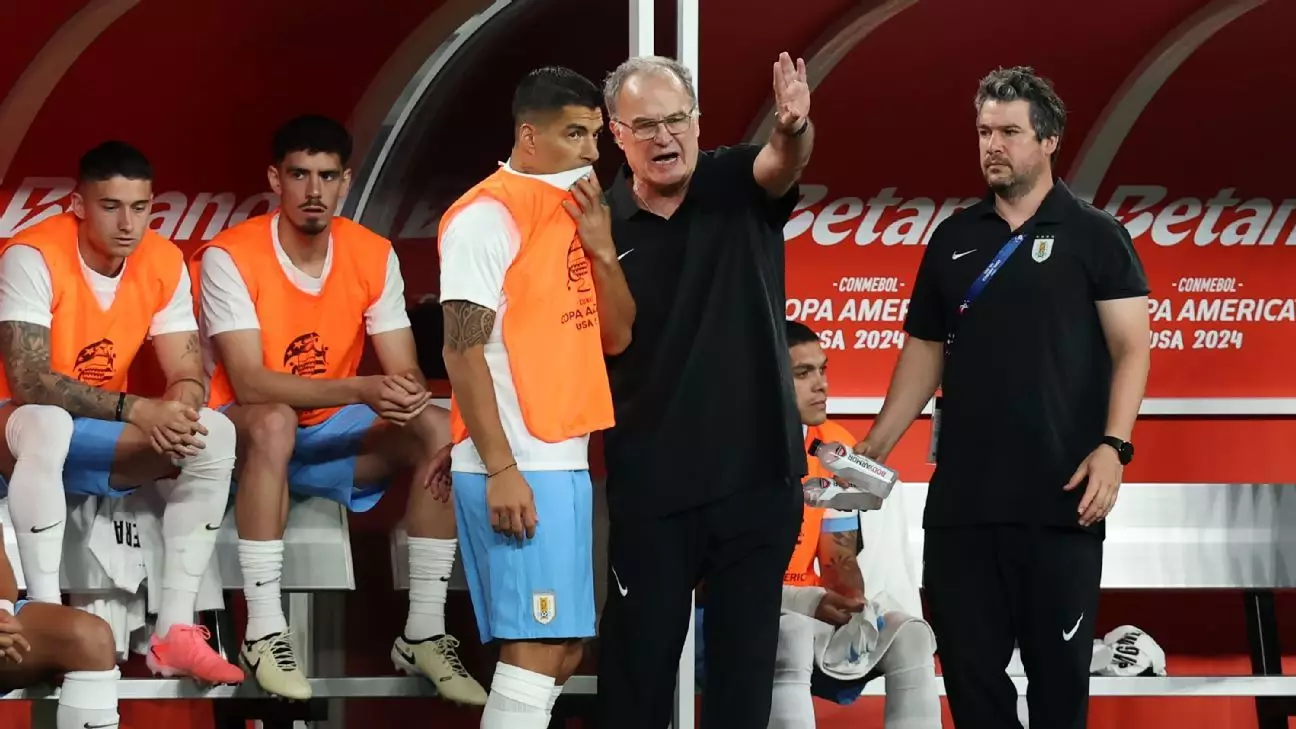The landscape of the Uruguay national football team has been dramatically altered since Marcelo Bielsa took the reins as head coach in mid-2023. Renowned for his tactical prowess, Bielsa’s methods have sparked a wave of controversy, drawing critical comments from key players like Luis Suárez. In a recent interview, the veteran striker opened up about the challenges and unsettling culture he perceives within the team, particularly during the 2024 Copa América. As one of Uruguay’s most distinguished players, Suárez’s assertions place a spotlight on the intersection of team dynamics, player welfare, and coaching philosophy.
At the core of the issue are the seemingly restrictive conditions imposed by Bielsa, which have raised eyebrows among players and fans alike. Suárez detailed an unsettling environment at the Celeste Complex, where team members reportedly cannot freely interact with staff or even engage in communal meals. These conditions, he claimed, have fostered a sense of isolation, hindering the harmonious collaboration that a national team thrives upon. “It breaks my heart that this is how life is in the Complex today,” Suárez lamented, urging the public to refrain from blaming players for any future shortcomings.
Communication, or lack thereof, appears to be another troubling pillar of Bielsa’s leadership as highlighted by Suárez. The emotional weight of his remarks is evident, reflecting a palpable frustration that many players share. During the 2024 Copa América, Suárez and his teammates reportedly felt increasingly alienated from their coach, noting a complete absence of basic courtesies, including a simple greeting. This exacerbation of feelings led to a player-led initiative, requesting that Bielsa improve his engagement with them. “Many players held a meeting to ask the coach to at least say good morning to us,” he shared.
Despite a respectable performance that brought Uruguay a third-place finish in the tournament, Suárez’s revelations expose profound underlying issues. The tensions within the squad echo concerns that Bielsa’s tactical genius does not necessarily translate into effective leadership and interpersonal relations. The enigmatic coach, while eloquent in press conferences, may be failing to foster the necessary camaraderie vital for any team striving for success on international stages.
Bielsa’s unconventional methods have raised questions about his suitability for a national team that thrives on tradition and unity. Subtle remarks from Suárez about his closing conversations with Bielsa underscore the reality that all is not well in the camp. Listing his efforts to address these pressing issues, Suárez’s final interactions with the coach were met with a meager acknowledgment—”Thank you very much”—leaving much to be desired in terms of actionable change.
As Uruguay sets its sights on the 2026 World Cup, Suárez’s call for fans to be empathetic and understanding towards player performances seems particularly poignant. The team currently finds itself in a fragile position in the Conmebol rankings, and the pressures of upcoming qualifiers against formidable opponents add additional strain. Suárez’s warning regarding Bielsa’s divisive training methods indicates a persistent rift that may only widen as the tournament approaches.
Luis Suárez’s departure from the national team, leaving an impressive legacy as Uruguay’s all-time leading scorer, has brought an introspective lens to the current state of La Celeste. His acknowledgment of the tumultuous atmosphere under Bielsa casts a long shadow over the future of the team as they strive to reclaim their former glory. With such a profound shift occurring, it is crucial that both players and coaching staff recognize the significance of unity, open communication, and mutual respect.
As the narrative unfolds around the Uruguay national team, one can’t help but wonder if Bielsa’s time at the helm will be deemed a successful reinvention or a cautionary tale of how great talent can falter through misalignment. As fans gear up for what lies ahead, the balance between criticizing performances and recognizing the structural challenges within the squad will indeed be a tightrope act. The world of football is watching closely; the future of La Celeste hinges not only on talent but on the understanding and cohesion that any team needs to thrive.

